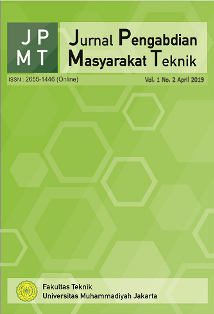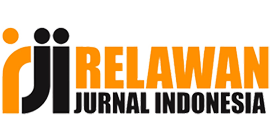PEMBERDAYAAN KELOMPOK MASYARAKAT NON EKONOMI DI LEMBAGA PENDIDIKAN AGAMA MELALUI PELATIHAN PENGOLAHAN LIMBAH B3 RUMAH TANGGA MENJADI PRODUK KERAJINAN TANGAN DENGAN MEMANFAATKAN TEKNOLOGI TEPAT GUNA
DOI:
https://doi.org/10.24853/jpmt.1.2.69-74Keywords:
limbah, santri, teknologi, produk kreatifAbstract
Tujuan dari kegiatan ini adalah memberdayakan siswa santri untuk dapat membuat produk-produk kerajinan tangan yang berasal dari olahan limbah B3 rumah tangga dengan menggunakan teknologi tepat guna sederhana Adapun metode yang digunakan adalah pelatihan dan pendampingan yang dilakukan dalam kurun waktu 10 jam. Hasil yang diharapkan dari kegiatan pelatihan dan pendampingan ini adalah meningkatnya kemampuan pengetahuan dan keterampilan siswa santri dalam membuat dan menghasilkan produk kerajianan tangan dengan menggunakan teknologi tepat guna.References
BPS. (2010) www.bps.go.id. [Online]. https://www.bps.go.id/website/pdf_publikasi/profil-kriminalitas-remaja-2010.pdf.
Karuniawati Dewi Ramadani, Eko Budiatmodjo Armadi Setiawan, Statistik Pemuda Indonesia 2014. Jakarta: Badan Pusat Statistik, 2015. [Online]. www.bappenas.go.id/files/data/./Statistik%20Pemuda%20Indonesia%202014.pdf.
Josephus Primus. (2016, Maret) Ekonomi/Inspirasi. [Online]. http://bisniskeuangan.kompas.com/read/2016/03/30/192821726/Menggenjot.Jumlah.Ideal.Pelaku.Wirausaha.Indonesia.
Gaudensius Suhardi. (2016, January) Humaniora. [Online]. http://mediaindonesia.com/news/read/26590/sampah-nasional-170-ribu-ton-hari/2016-01-30
Kemenag. (2013, Februari) Pendis.Kemenag.go.id. [Online]. http://pendis.kemenag.go.id/file/dokumen/pontrenanalisis.pdf
Downloads
Published
Issue
Section
License
Authors who publish with this journal agree to the following terms:
- Authors retain copyright and grant the journal right of first publication with the work simultaneously licensed under a Creative Commons Attribution License that allows others to share the work with an acknowledgement of the work's authorship and initial publication in this journal.
- Authors are able to enter into separate, additional contractual arrangements for the non-exclusive distribution of the journal's published version of the work (e.g., post it to an institutional repository or publish it in a book), with an acknowledgement of its initial publication in this journal.
- Authors are permitted and encouraged to post their work online (e.g., in institutional repositories or on their website) prior to and during the submission process, as it can lead to productive exchanges, as well as earlier and greater citation of published work (See The Effect of Open Access).






